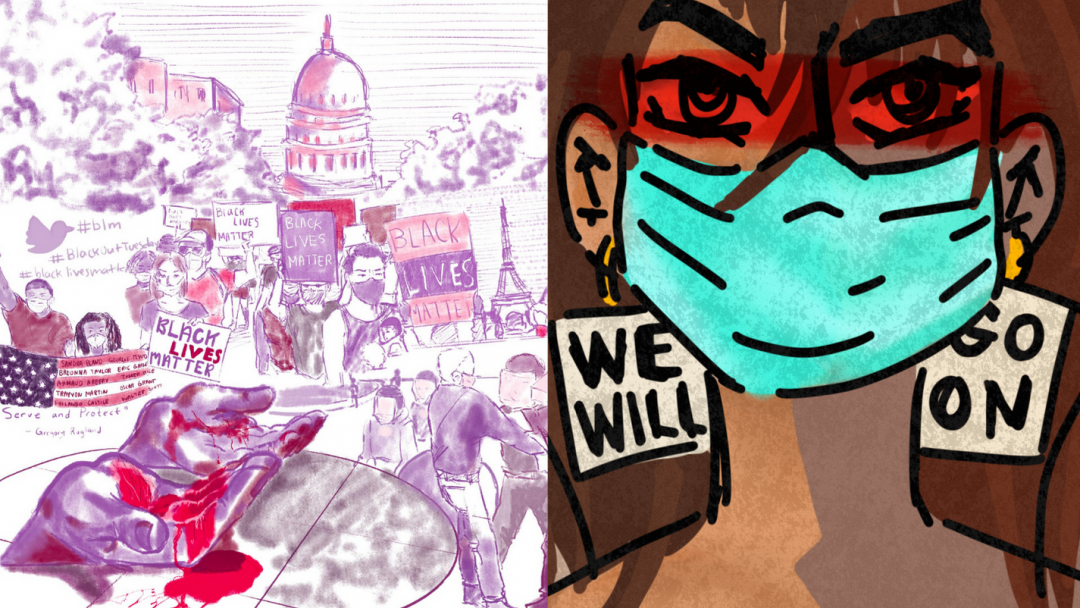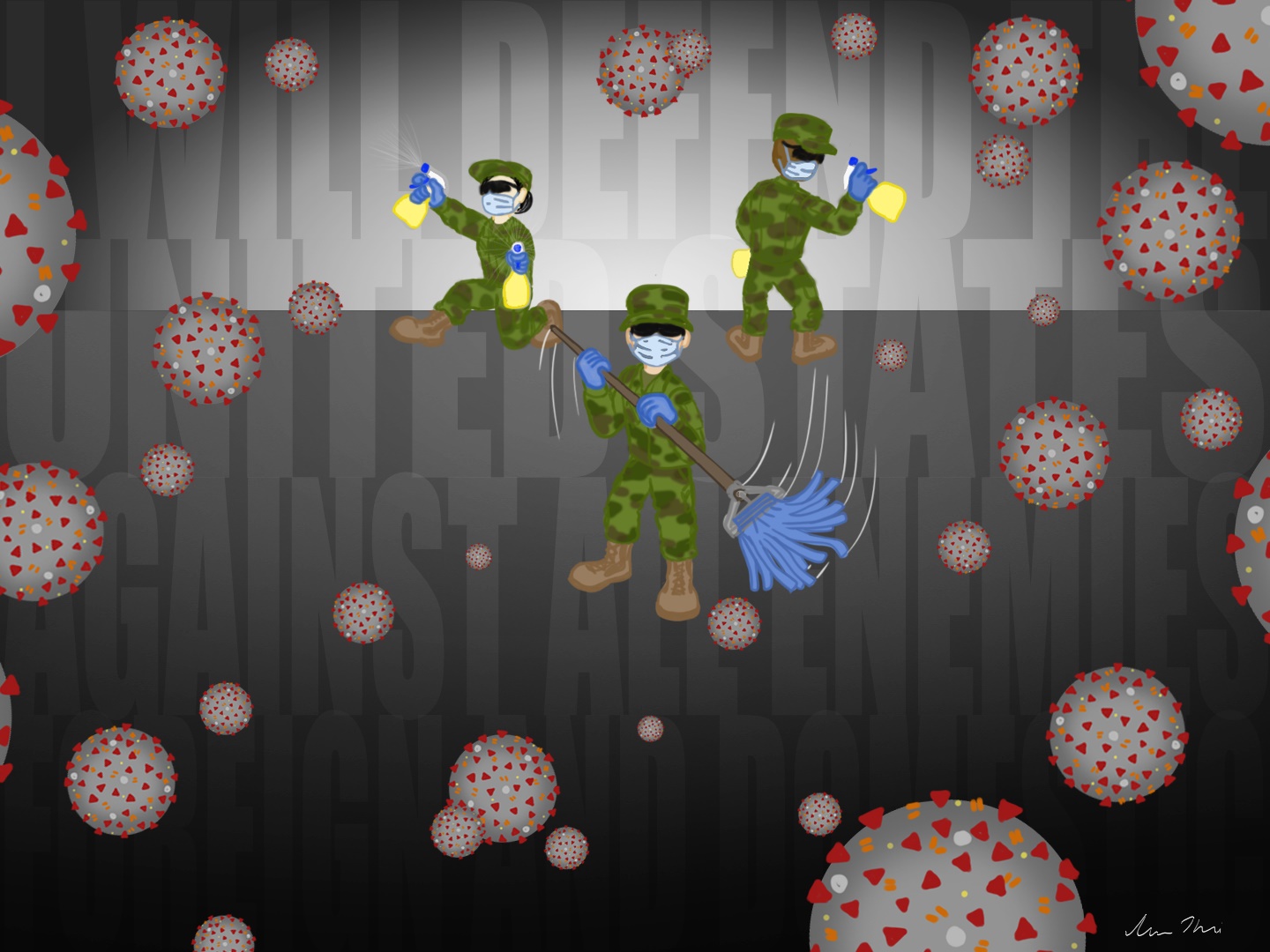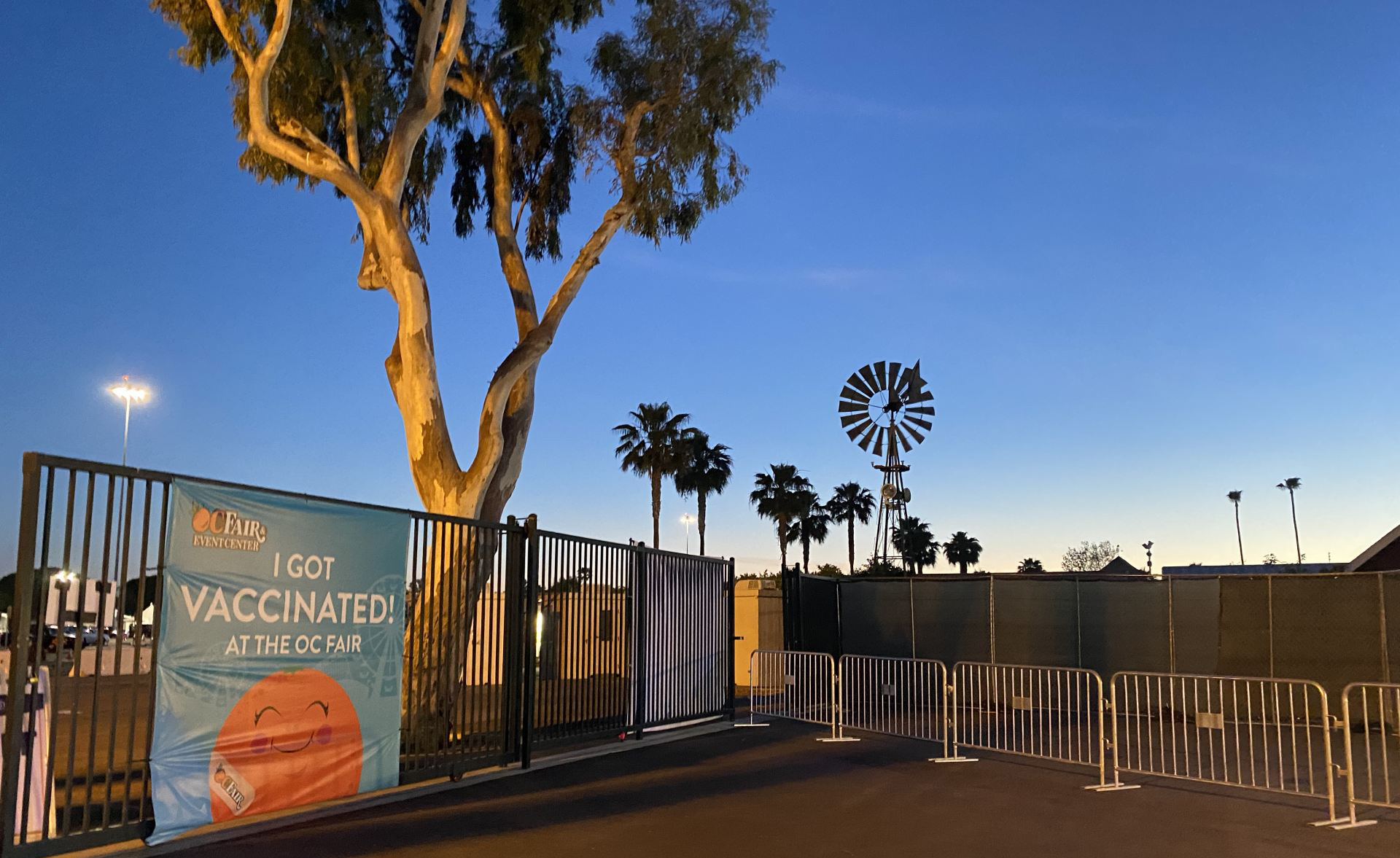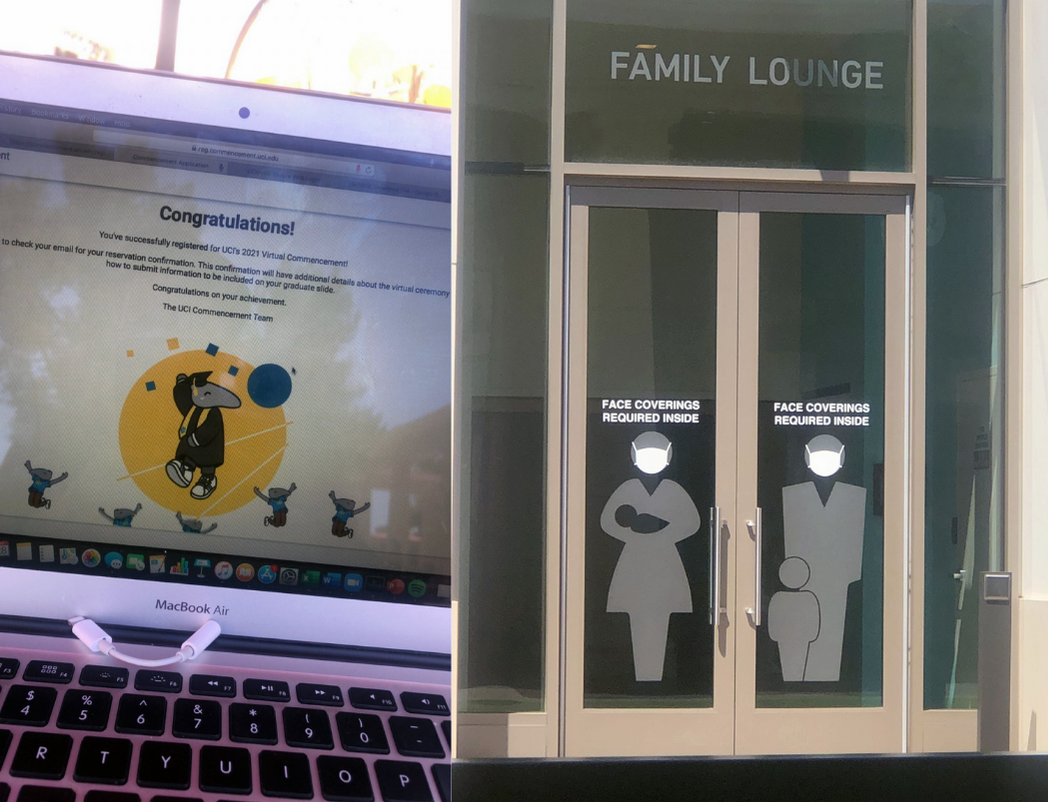
Artwork created for the Pandemic Histories Archive by Jeanette Hernandez (above, left) Laney Dang (above, right) and Alissa Thai (below).
“I just want the misinformation and blaming of specific races and minorities to stop because it …
amounts to hate and stigmatization of people who, at the end of the day, are all human.” — Catherine Pham, Spring 2021
“It was very difficult to adapt to living at home – all of my obligations felt purposeless because I felt a sense
of detachment from the world and almost equivalent to nonexistence.” — Alice Myung, Fall 2020
“By the will of the American people, there will be a new president on January 20, 2021. … These past years,
especially this year, have drained my American pride and hope.” — Isaac Gilbert Rubalcava, Spring 2021
Field study focuses on student reflections
Student reflections of a historic time — 2020-present — are being recorded and archived as part of the School of Social Ecology’s field study project that was created last year when the pandemic caused schools and businesses to shut down or limit activities. More than 180 students, who all have been trained in oral history and ethnographic techniques, have contributed to the project so far.
 Since the School was founded in 1970, every undergraduate has been required to participate in field study, doing 100 hours of service at one of more than 200 partner sites, which include nonprofit organizations, municipal agencies, local governments and businesses. The Pandemic Histories Archive project was developed through a collaboration between the School of Social Ecology, the UCI Libraries, and the Blum Center for Poverty Alleviation’s Compassion in Action program. It offers a unique option for students to meet their field study requirement. Their contributions include field notes about daily life, oral histories, photographs and videos and other files documenting the pandemic and social justice issues during this historic time.
Since the School was founded in 1970, every undergraduate has been required to participate in field study, doing 100 hours of service at one of more than 200 partner sites, which include nonprofit organizations, municipal agencies, local governments and businesses. The Pandemic Histories Archive project was developed through a collaboration between the School of Social Ecology, the UCI Libraries, and the Blum Center for Poverty Alleviation’s Compassion in Action program. It offers a unique option for students to meet their field study requirement. Their contributions include field notes about daily life, oral histories, photographs and videos and other files documenting the pandemic and social justice issues during this historic time.
Led by Susan Bibler Coutin, associate dean for academic programs and professor of criminology, law and society, Richard Matthew, associate dean of research and international programs, Blum Center director and professor of urban planning and public policy, and Vivianna Goh, a social ecology Ph.D. student, the project features a blog and it is part of the UCI Libraries archive collection. Elvia Arroyo-Ramirez, UCI Libraries assistant university archivist, and Thuy Vo Dang, archivist for the Southeast Asian Archive and Regional History in the UCI Libraries, collaborated with Coutin, Matthew and Goh, guiding students and helping make the project successful.
Throughout history, pandemics have had pervasive and enduring impacts on societies, Coutin and Matthew note. “In terms of its accelerated global reach, and the forceful responses it has triggered, COVID-19 is a novel experience for humankind, one that is causing considerable suffering and remarkable expressions of compassion, and that will likely catalyze many forms of social and behavioral change across the planet.”
In the U.S., COVID-19 has intersected with multiple forms of inequality and injustice, affecting people in dramatically different ways, they add. “It is important to record these diverse experiences, to be inclusive in assembling the historical record of this crisis, and to give future generations as complete an understanding of what happened as possible.”
Goh says the most rewarding part of the project has been empowering students to share their stories.
“For the past couple years, it's been too easy to normalize all the stressful, historic events we've been living through,” she says. “The Pandemic Histories Archive project has helped students understand the importance of their experiences. Some of our interns are essential workers, parents, international students, or part of other groups that have been severely impacted by the pandemic. Despite their hardships, they've been able to offer many positive insights and cherished moments in their archive submissions. I am so inspired by their resilience and creativity! I'm also grateful to work with Associate Deans Susan Coutin and Richard Matthew, who have shown so much compassion for our students. They make me feel proud to be a part of UCI's School of Social Ecology.”
A few excerpts from the archive:
Video offering UCI students a guide to food security by Madison Tran:
“It is important to understand that meeting the basic needs of students largely impacts their mental health, academic performance, work productivity, and overall wellbeing. I encourage students to take advantage of the opportunities and resources available at the UCI FRESH Hub as they serve as a home for UCI students to have their basic needs met, and a guarantee to never face another empty fridge again. For more information visit https://basicneeds.uci.edu/”
 Photograph of vaccination site by Karen Torres:
Photograph of vaccination site by Karen Torres:
“On this day in May of 2021, I took my father to get vaccinated at the OC Fair, located in Costa Mesa, California. Seeing the place where the OC Fair is traditionally held as a vaccination site was very intriguing to me. I would have never thought that I would see places like this be closed off and used as a mass vaccination site. I decided to photograph this moment, as I thought future generations would find it as interesting as I did.”
Field diary from Yuange Zhou:
“When the COVID-19 first spread in the United States and Europe, there was much news reported about Asians assaulted in the public because of their race and appearance. Those attackers may not even know the people they just attacked—attackers only did this because they believed Asian people were the cause of COVID-19 transmission… Right now, I genuinely wish to defeat COVID-19 and stop such social injustice by recording and spreading my experiences, and feelings to others.”
Photograph of a UCI commencement screenshot by Matthew Johnson:
 “I decided to take this photo on April 28, 2021 after registering for virtual commencement. With the pandemic and health guidelines, the UCI 2021 graduates are having a virtual commencement. Although I originally took this photo to send to friends as a joke, I figured it would be appropriate to include it as a part of this historical moment. It is crazy to think about how graduates are receiving congratulations through an email or by registering for an online commencement ceremony. Never would I have thought that my college graduation would take place virtually through a PowerPoint.”
“I decided to take this photo on April 28, 2021 after registering for virtual commencement. With the pandemic and health guidelines, the UCI 2021 graduates are having a virtual commencement. Although I originally took this photo to send to friends as a joke, I figured it would be appropriate to include it as a part of this historical moment. It is crazy to think about how graduates are receiving congratulations through an email or by registering for an online commencement ceremony. Never would I have thought that my college graduation would take place virtually through a PowerPoint.”
Photograph of signage by Matthew Johnson:
“I decided to take this photo on April 9 2021 as I walked into work. The photo shows the entrance to the family lounge, or where the restrooms are located, inside the mall. Working in a mall during the COVID-19 pandemic has proved to be rather interesting with social distancing guidelines and safety precautions. During the height of the pandemic and the stay at home orders, I can recall most of the mall being a ghost town since the majority of shops were mandated to close. Once the mall began to reopen with social distancing guidelines, signs asking guests to maintain social distance and to wear facial coverings were plastered everywhere you looked. Usually, I never pay attention to these signs walking into work because I see them everyday. On this day, however, it hit me that this is simply the new norm to create signs like the one shown. Not only is it the new norm to have signage requiring face coverings, but this diagram shows what the new family outing looks like. I also wondered why they chose not to put a face covering on the child as I would assume they look old enough to wear one. As I walked away, I wondered how long diagrams like this one would last.”
Poem, “My Home Was A Hiding Place,” by Catherine Pham:
My home was a hiding place.
Inside its rooms, I worried about my hopes and fears.
Under its covers, I pondered questions I felt afraid to accept.
Within its walls, I reminisced for a better tomorrow.
My home was a hiding place.
It built a wall between the outside world and me.
It built a wall between my friends and family.
It built experiences I may never have again.
It built words I may never speak again.
My home was a hiding place.
My home was a shelter.
My home was a prison.
My home never stopped moving forward.
Oh, it stopped to listen.
Oh, it stopped to see.
Oh, it stopped to laugh.
Ah, of course, it stopped to cry.
My home was a hiding place.
In the dark, the television would murmur.
In the light, the noises outside would heighten.
In the morning, I bid my family “Goodbye.”
And in the night, I showered them with “I love you’s.”
My home was a hiding place.
Inside my room, I was kept tucked away.
Concealed from prying eyes and with games at my fingertips.
Stories were read and secrets were kept.
Eyes were wide open and in a fit I slept.
My home was a hiding place.
It was one of the many still waiting.
In a few months, its fate will also be decided.
There are homes who experienced the freedom they wished for.
But its fate will be decided.
My home was a hiding place.
With nowhere to run and hide.
For the girl too afraid to meet outside.
All her friends of who she wanted to see.
My home was a safe place to dream.
My home was a hiding place.
When the vaccine was administered, it was filled with worry.
As I dreamt of a better tomorrow, my body swelled with heat.
I slept, I slept, I slept.
When will it all end?
My home was a hiding place.
It protected against the violence and hate.
But it never taught me how to get rid of the worries.
I wish I could shout the words I never got to say.
Maybe through this poem I could.
My home was a hiding place.
For an end to this pandemic, it yearns and seeks.
For a better future, I study and graduate.
As I dreamt of a better tomorrow, my body swelled with heat.
I slept, I slept, I slept.
Contact:
Mimi Ko Cruz
Director of Communications
949-824-1278
mkcruz@uci.edu
Related:
Pandemic Histories Archive project blog